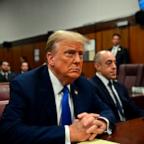Milosevic Trial Also Big Test for Tribunal
Feb. 11 -- When the trial of former Yugoslav President Slobodan Milosevic begins Tuesday, he won't be the only one to face the test of a lifetime. The U.N. War Crimes Tribunal itself faces a major challenge.
Milosevic's case is already being billed as Europe's most important since the Nuremberg proceedings against Nazi Germany's leaders, and his primary legal strategy appears to be to challenge the legitimacy of the proceedings.
Ever since he first appeared before the court in The Hague, Netherlands, in July 2001, the 60-year-old former Balkan strongman has challenged the legitimacy of the court, refusing to appoint defense lawyers, and insisting on speaking for himself.
He has branded the court a blatantly illegal body, manipulated by his Western foes, and set up to condemn him, Yugoslavia and Serbs.
"It is without doubt political and has been called on to judge and condemn not just Slobodan Milosevic but the state of Serbia and Yugoslavia and the Serbs for the guilt that others are responsible for," his brother Borislav told Reuters today.
Borislav said the tribunal had no legitimacy since the U.N. Security Council had no mandate to set up such a court, and said he was suspicious about how it was financed, because it had no controlling mechanism to monitor its procedures and no appeal system.
He also said charges against his brother were "impossible," because his brother was a co-signatory of the Dayton peace agreement that established peace in the region.
Attack the Attackers
Supporters of Milosevic accuse the West of turning on him as a scapegoat after using him as a "peacemaker" in the mid-1990s.
One of Milosevic's advisers, Zdenko Tomanovic, told The Associated Press he would ask the court "why several world leaders had supported his policies, and now the prosecutor says that those policies were criminal."
Milosevic reportedly plans to demand that several former and present world leaders — including former U.S. President Bill Clinton, British Prime Minister Tony Blair, former NATO head Javier Solana, and U.S. envoy Richard Holbrooke — appear before the court to testify to their change in attitude toward him.




